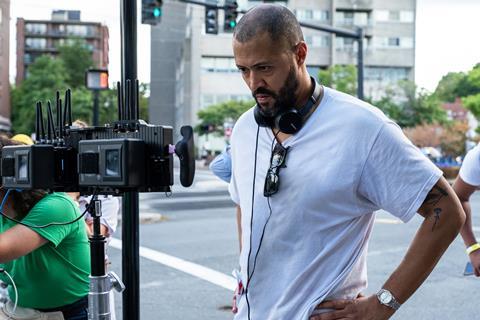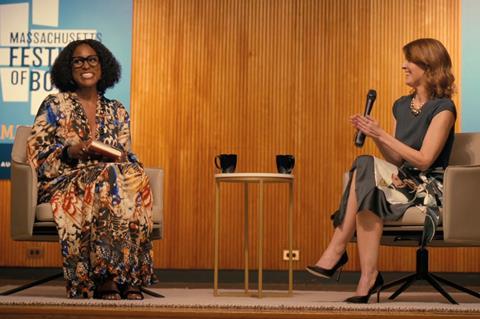
Cord Jefferson, like most of us, had a terrible 2020, thanks in no small part to the pandemic. But in that September, Jefferson — an Emmy award-winning writer of prestige TV — also suffered “a huge professional failure”, when his first self-created TV series, Scraper, based on his time as a writer at the infamous website Gawker, had the plug pulled by Apple late in development. “Everybody was confident we were going to get on the air,” he recalls. “We wrote all the scripts. We had a writers’ room. Then we found out it was being killed. I was crestfallen.”
That December he read a book review for Charles Yu’s Interior Chinatown, a novel about race and pop culture, in which the reviewer mentioned Percival Everett’s Erasure, published in 2001.
Jefferson was intrigued. He snapped up Everett’s book and devoured it over the holiday period. “About 50 pages into it, I knew I wanted to adapt it. Pretty soon after that, I was thinking maybe I want to direct it. Soon after that, I started reading it in [actor] Jeffrey Wright’s voice. No piece of art had resonated with me deeper, before or since.”
Ghetto fiction
In Erasure, and in Jefferson’s film adaptation American Fiction, which won the people’s choice award at Toronto International Film Festival in September, the character of Monk Ellison is a prominent middle-class, suburban Black writer whose well-respected novels sell few copies. After his latest manuscript is rejected by several publishers, and exasperated by the industry’s interest in a particular type of Black-themed story from Black authors — ie involving gangbangers, drug dealers and pimps — Monk pens, under a pseudonym, a parody of ghetto fiction entitled Ma Pafology (he later insists its name be changed to Fuck). To his utter horror, the novel garners a huge advance, critical acclaim and a movie deal.
“I was a journalist for eight years and those were conversations I was having with my journalism friends,” reveals Jefferson, whose late mother was white and father is Black.
“Why is everybody always coming to me for [stories about] Black teenagers being murdered by the police? Why is everybody coming to me for something racist that somebody said about [then] President Obama?
“There was this revolving door of misery that was my job — to explain why these tragedies were happening in the Black community. I wrote an article called ‘The Racism Beat’ about that [in 2014].
“When I started in film and TV, I found there were the same restrictions on what they expected Black artists to write,” he continues. “It was slave movies and civil-rights leaders, gang members and drug dealers. There was a limited view of what Black life looked like. So those things [in the book] resonated with me.”
Beyond that, Monk’s tortured family life, involving sibling strife and a sick parent, also rang a bell. “I have two older brothers,” says Jefferson. “We have a trio sibling dynamic where sometimes we’re closer, sometimes we’re distant.
“My mother didn’t die of Alzheimer’s, my mother died of cancer, and in the way [Monk’s sister] is taking care of the mother because she lives in her hometown, my oldest brother was doing that and at a certain point I moved home to help. Then, we have a very overbearing father figure who looms large in our life and probably will after he’s gone.
“I understood the book on such a molecular level,” he adds. “It’s strange to think if that show had been made, I wouldn’t have made this movie. Finding that book felt serendipitous.”

Jefferson had not written a film script before, much less directed. Not that it stopped him. His manager Jermaine Johnson of 3 Arts Entertainment called Everett’s agent, and Jefferson and the novelist spoke on the phone early in 2021.
“Then he gave me the rights for free for six months. He said, ‘If anything comes of it, we can discuss a fee afterward.’” (Angela Bassett had previously optioned Erasure in the early 2000s, intending it to be her directing debut.) “I wrote the script. Took me about four months. Once we found a buyer, we settled with Percival.”
His manager had sent the script to numerous independent producers to positive responses, but it was T Street, run by Ram Bergman and Rian Johnson, which said yes in the room.
“We had meetings with about 13 or 14 [producers], but everyone except for T Street said, ‘We want to package it. We want to attach actors,’ probably to shield us from criticism — I was inexperienced,” recalls Jefferson. “So, I went with T Street. Then we attached Jeffrey [Wright].”
Financing came from MRC — the budget “was significantly less than $10m” — but finding a distributor was difficult. “After we had such a feeding frenzy with producers around the script, we had Jeffrey, we had financing, I was sure it was going to be easy to find a distributor,” says Jefferson. “But we only got two offers.”
They went with Orion/MGM, which will release in the US on December 15, with Curzon releasing in the UK on February 2. “Everybody else said, ‘We love the material, but we can’t make this movie here,’” notes Jefferson. “I knew Hollywood was risk-averse, but I was taken aback as to how risk-averse everybody was.”
Even Wright took three months to say yes. “Jeffrey’s in The Batman, in 007, Westworld. He’s on speed dial for Wes Anderson. It is a risk for him to start working on a film with somebody who has never directed anything and never written a film before.
“When he signed on, it legitimised the movie in many people’s eyes. The financiers were willing to come up with more money, other actors were more excited to get on the project.”
As a character, Wright’s Monk might be compared to Paul Giamatti’s unsuccessful writer character Miles Raymond in Sideways. “I can see that,” agrees Jefferson. “Some of my big influences are [Sideways director] Alexander Payne, Nicole Holofcener. Those filmmakers do a really good job of representing life that is neither comedy nor tragedy. It’s frequently both. The loveable curmudgeon is frequently a middle-aged white man. Those aren’t parts really afforded to people of colour. Jeffrey is one of the greatest actors of his generation and should be front and centre more often. I realised after this I hadn’t seen him in a lead role since Basquiat, which is almost 30 years ago. That’s outrageous.”
When the script went out, and right through its 26-day shoot, the film was called Fuck. “We obviously had to change that for reasons of marketing,” laughs Jefferson. The book’s title was discounted “largely because we were worried people would confuse it with Eraser, the Arnold Schwarzenegger movie from the ’90s. I came up with American Fiction about three weeks before we locked.”
The movie bug
American Fiction marks another big step for Jefferson, who first made a career as a journalist for USA Today, Huffington Post and others, before he moved into television writing.
In 2012, he wrote a satirical piece for Gawker about predominantly white teenagers going wild after a surf competition in Huntington Beach, California. The next day MSNBC anchor Chris Hayes invited him on the show to do a “spoof one-act play” in which Jefferson was interviewed “the way Bill O’Reilly on Fox News might an expert on Black teenagers. We did a six-minute spot where we essentially rehashed my article.”
A few months later, Mike O’Malley, the creator and showrunner on Starz series Survivor’s Remorse, reached out, asking if Jefferson would like to join his writers’ room. He did. “I had never written a script before.”
Subsequently, he worked on Masters Of None, Succession and The Good Place and won an Emmy for Watchmen. Jefferson has an overall deal at Warner Bros Television and now the WGA strike is over there is more TV on the horizon. But, he says, he has been bitten by the movie bug.
“I’m addicted. I want to keep making movies. I loved my TV jobs, I learned so much, but there’s something about being on set, getting your hands dirty, being in the thick of it… I want to keep doing it forever.”

























No comments yet